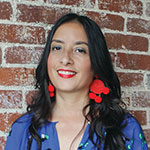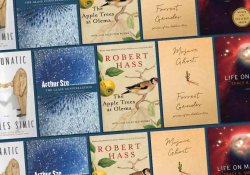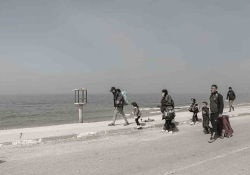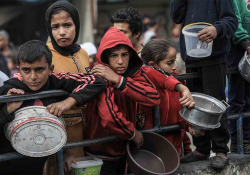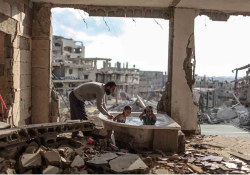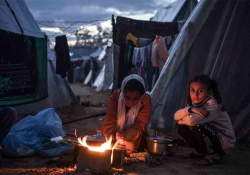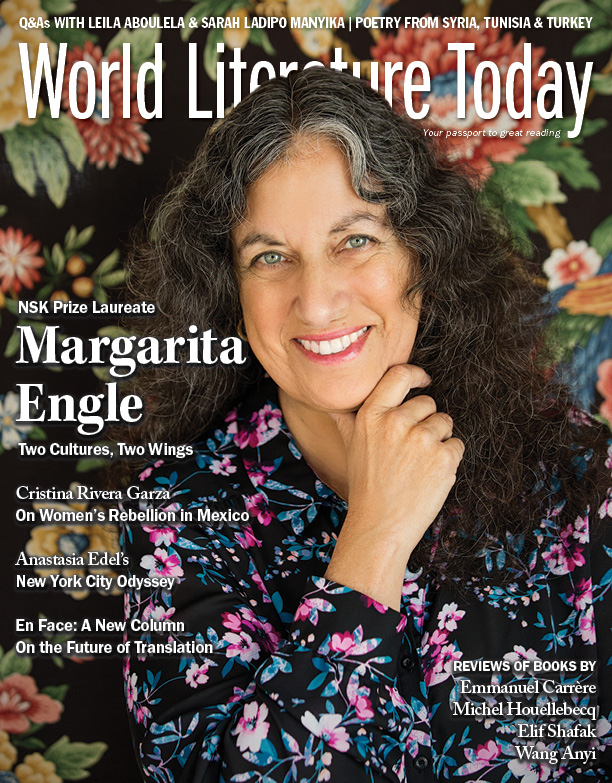Two Wings, One Generous Heart: A Tribute to Margarita Engle
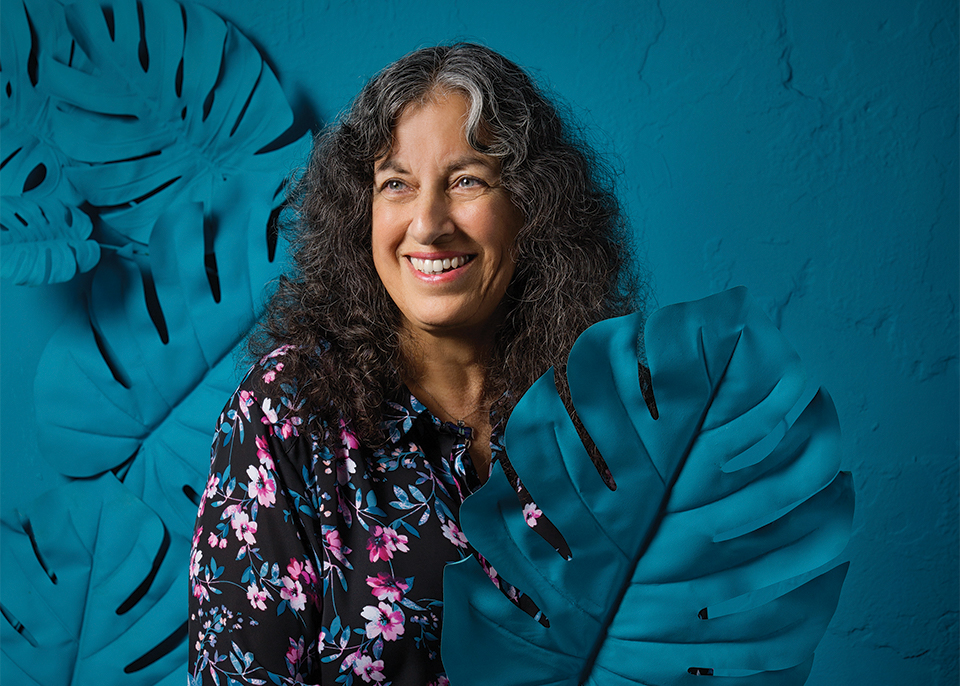
Lilliam Rivera served on the jury that chose the 2019 NSK Prize winner and successfully championed Margarita Engle as her nominee. On the first day of the 2019 Neustadt Lit Fest, she delivered the following tribute.
Thank you to the Neustadt Prize committee, World Literature Today, and the University of Oklahoma. I feel so honored to be a part of this wonderful swirl of events this week. Not that many institutions uplift the written work of others, especially authors who write for children. I’m lucky to be able to contribute a small part in this week’s celebration.
My young-adult novels include The Education of Margot Sanchez, a coming-of-age story set in the South Bronx, New York, and my latest, Dealing in Dreams, a dystopian tale about girl gangs and their violent search for a home. I was born in the Bronx, and my parents are both from Puerto Rico.
But today is not about me or my books. Today, I want to talk about Margarita Engle and how her words have shaped my own, how her poetic eye has opened wondrous worlds to countless young children, and how her razor-sharp focus on truth and hope is so inspiring. We will revel in her written words and again be reminded that the literary path she has generously trudged along has led us all to this very special week.
Before we start anything, I think it’s important that we bless the room with a little bit of poetry. I have such great admiration for poets, a written form I’ve never tried to write, not yet anyway. But I always sleep with poetry collections by my bedside so that the verses can hopefully penetrate my dreams.
Poetry is really Margarita’s language, so I’ll start with a couple of poems by one of her favorites, the Cuban poet José Martí. If you’ll indulge me, the first poem is titled “Oh, Margarita.” It is a love poem, because really, this week is all about amor, and I will read it in Spanish.
¡Oh, Margarita!
Una cita a la sombra de tu oscuro Portal
donde el friecillo nos convida a apretarnos los dos,
de tan estrecho Modo,
que un solo cuerpo los dos sean:
Deja que el aire zumbador resbale,
Cargado de salud,
como travieso Mozo que las corteja,
entre las hojas y en el pino rumor y majestad mi
verso aprenda.
Sólo la noche del amor es digna.
La oscuridad, la soledad convienen.
Ya no se puede amar, ¡oh Margarita!
The next poem is titled “Two Homelands,” and this I will read in English.
Two Homelands
I’ve got two homelands: Cuba and the night.
Or are both the same? As soon as
the sun takes his majesty away, with long veils
and a carnation in the hand, silent
Cuba shows itself to me like a mourning widow.
I know which bloody carnation
it is that trembles in her hand!
My chest is empty, torn and empty
where the heart used to be. It’s time
to start dying. The night is good
to say good-bye. The light bothers
and the human word. The universe
speaks better than the man.
Like a flag
that invites you to battle, the red flame
of the sail flutters. The windows
I open, already tight in me. Silent, breaking
the carnation’s leaves, like a cloud
that blurs the sky, Cuba, a widow, passes . . .
(trans. Agustina Ponce)
These two poems both speak of the longing of a distant home, a distant lover, perhaps. But to me the poems also remind me of the resilience found in between the melancholy and the violence. When I read Margarita’s work, I can feel that same resilience threaded throughout her verses and sentences, whether she is writing about Teresa Carreño, the piano girl who was invited to play for Abraham Lincoln, in her 2019 picture book Dancing Hands, or about Antonio Chuffat, who became a champion of civil rights as Margarita wrote about in her 2016 middle-grade novel in verse, Lion Island: Cuba’s Warrior of Words, or even in her 2016 memoir in verse, Enchanted Air: Two Cultures Two Wings.
HERE'S THE DEFINITION of the word resilience: “Resilience: the power or ability to return to the original form, position, etc. after being bent, compressed, or stretched; ability to recover readily from illness, depression, adversity, or the like, buoyancy.”
The words in this definition I would highlight if I were back in school would be the words ability to recover from adversity and buoyancy. Now there’s something magical about the word buoyancy. And if you read Margarita’s work, you will find her young protagonists—the activists, the budding scientists, musicians, and artists—are not only surviving life but also sometimes bringing light to the darkest of places and periods.
If you read Margarita’s work, you will find her young protagonists are not only surviving life but also sometimes bringing light to the darkest of places and periods.
The first time I read Margarita’s work was in 2011, and I was a first-time mom of my beautiful, sweet daughter, Isabel. I wasn’t writing fiction at the time, just kind of lingering around the outskirts of the possibility, of the maybe. My background to this point was in entertainment journalism, so writing had always been a part of me. (On a side note, I’ve shared this many times before, but writing is the only way I dealt with things. As a shy kid growing up in the housing projects, I wrote in a notebook all my fears and my happiness, but it wasn’t something I shared with anyone. I read everything, and the one thing that saved me was visiting the local library.) But writing fiction, that was something I couldn’t even deem possible, not for someone like me, some random nobody from the Bronx housing projects. But here I was, a young mom really lost in parenting and searching for any type of anchor to keep me going in what seemed like a fruitless endeavor. As a journalist, my job was always to look for Latinos/Latinas who were breaking in to the very white publishing industry. And because I wanted my young daughter to listen to the words written by Latinas, I searched for a picture book I could share.
I picked up the 2010 picture book Summer Birds: The Butterflies of Maria Merian. In pared-down language, Margarita introduces Maria Merian, a young scientist in the Middle Ages who is determined to study the “summer birds,” the butterflies that so many deemed to be evil. It was a picture book about being fearless and pursing your passion against what can be insurmountable odds. Back during the Middle Ages, young girls were considered witches if they were caught doing anything out of the ordinary like studying insects. Summer Birds was joyous and wondrous, with stunning illustrations provided by Julie Paschkis. I would read Summer Birds to my child every night, and Margarita’s sparse words penetrated within. Here was a story of a young girl searching for the truth, against all obstacles. What more did I need? This was a sign to keep moving forward with my own writing.
Here’s an excerpt from the picture book from the beginning pages:
Each year, the sky fills with summer birds. Many people call them butterflies. Everyone believes that these insects come from mud, as if by magic. I disagree. I am only thirteen years old, but I capture insects. I study them. I have to catch my insects in secret. Neighbors would accuse me of witchcraft if they knew.
A little bit about Margarita: she was born in Pasadena, California, to a Cuban mother and American father who fell in love when her father traveled to Cuba and met her mom. Margarita grew up in Los Angeles but spent many summers traveling back to her mother’s homeland. It was during these youthful excursions that Margarita discovered the importance of extended family and the fragileness of home as traveling to Cuba became restricted.
“Even though my experience was not that of a Cuban-born refugee, I felt like I’ve inherited a surrealistic form of exile. Life seemed like science fiction.” When I listened to Margarita say these words in her 2010 appearance at the National Book Festival in Washington, DC, I was overcome with emotions. Just like Margarita’s mother, who left Cuba with her father to the States, my parents left Puerto Rico to begin anew in New York. My summers were spent traveling back and forth to the island. Those summers in Puerto Rico were so magical and beautiful. They were about family and wonder. And although the huge difference between Cuba and Puerto Rico is that Puerto Rico is a commonwealth of the United States, there is still an ongoing unanswerable question of “what if” that is at times hard to grapple with.
But Margarita finds a way of explaining it as a “profound sense of wonder about the strangeness of life.” What would our lives have been if our parents didn’t fall in love and left for their own adventures? What if I had been born in Puerto Rico or Margarita in Cuba? How different would our lives have been? This is a topic I spend a lot of my writing life trying to translate through fiction, these feelings of dreamlike attachment to an island I am not 100 percent a part of but still have a strong relationship with that molds me, transforms my way of seeing the world.
I loved discovering how Margarita read The Black Stallion, by Walter Farley, as a young kid. I too was so obsessed with the children’s book about young Alec Ramsay and Black Stallion, the only two survivors of a shipwreck. My love for the unknown was fueled by The Black Stallion. Although the characters were not Latino, I always connected to the sense of “otherness,” the strangeness of being in unchartered territory. It’s where my love for the works of Ray Bradbury, Mary Shelley, and all of the Judy Blume books began. Although so many of these books were set in a contemporary setting, it really felt as if I was reading science fiction because the experience of these characters seemed so outside of my own.
Margarita grew up in Los Angeles, and she’s mentioned in interviews how much she found the city to be chaotic and how she craved the “peace of nature.” We all know how Margarita studied agronomy and botany along with creative writing. Her affinity for nature flows throughout her work, with vivid descriptions that invite young readers to also fall in love with the living
realm of plants and animals. It is more than just setting; nature is a vivid protagonist in Margarita’s world. I love what she had to say about being in these spaces: “When I write a novel in verse, I feel as if the wilderness is one of my characters; forests, animals, and the Cuban weather . . . are powerful forces in my stories.”
IN MY OWN WORK, setting is also important. For most of my characters, there is usually a struggle to carve a place for themselves. My Bronx settings are always rooted in trauma. I really believe that there are memories (traumatic and beautiful) imprinted in these man-made structures, these buildings. In my past three novels, the beach always makes an appearance. It is as if the ocean is trying to remind the characters of their past lives, lives where these man-made structures were not the only source of home, that you can find home in the ocean, in the beads of sand, in the sun rays shining down.
While Margarita studied botany in college, I studied history because I wanted to read about the history I didn’t learn in elementary school or high school. In college I was finally able to study what I wanted to study. I read about the Black Panther movement, the Vietnam War, and liberation theology.
I wrote papers on the Mau-Mau uprising and China’s Communist Revolution and spent countless hours in the library researching all of it.
Now you can understand how important Margarita’s work is to me. Margarita has made it her mission to find ways of writing these unheard narratives, introducing these unknown histories to young people. It’s quite a powerful tool, to allow young people to discover scientists, activists, but also to see their strength against such hardship.
In Margarita’s 2008 seminal work The Surrender Tree: Poems of Cuba’s Struggle for Freedom—which won Margarita the Newbery, the first Latina to do so—we are introduced to Rosa, a nurse who turns hidden caves into hospitals to help those fighting for independence:
The names of the villages where runaways hide
are Mira-Cielo, Look-at-the-sky
And Silencio, Silence
Soledad, Loneliness
La Bruja, the Witch . . .
I watch the slavehunter as he writes his numbers,
while his son,
the boy we secretly call Lieutenant Death,
helps him make up big lies.
(trans. Alexis Romay)
Although Margarita writes about historical moments, she always finds a way to end her books with hope.
Margarita has said that she writes about people she admires, that their stories haunt her. The way that she’s able to capture these stories with such lyricism and depth, it’s what I strive to do in my own writing. Although I don’t write historical fiction, I try to find ways to write about historical events and how history affects young people, whether it is gentrification, the opioid crisis, or how incorporating violent traits can still lead to the same ill-fated dead end. And although Margarita writes about historical moments, she always finds a way to end her books with hope. “Even though history’s mistakes keep getting repeated, history’s freedom advocates always respond.”
The Lightning Dreamer: Cuba’s Greatest Abolitionist, Jazz Owls: A Novel of the Zoot Suit Riots, The Poet Slave of Cuba: A Biography of Juan Francisco Manzano. These are just a tiny sampling of the many books Margarita has written that are inspired by true events. I look at these books and the countless others she’s written and analyze or dissect them like I’m back in college at the library. They are a master class in fiction.
I look at these books and the countless others she’s written and analyze or dissect them like I’m back in college at the library. They are a master class in fiction.
For the past three years, I’ve been a teaching artist for the National Book Award Foundation’s BookUp. Once a week I visit a middle school in south central Los Angeles, and I lead a book club. The students select the books they want to read, and we talk about them, create collages and mock book covers, play games. The goal is simply to instill the joy of reading to these kids; that’s my job. And it’s great. They inspire me so much.
Last year, I had the children read a selection from Enchanted Air, Margarita’s memoir in verse. My favorite part of teaching the class is having them just sit down and read. The room gets very quiet, and they are intensely reading every word. There is something quite powerful in seeing young kids so engaged. After they finished reading, we made up our own bio in verse. On construction paper, I asked the children to write a one-page memoir of themselves. On the other side of the paper, they created their own book cover using scraps taken from magazines. And one by one, they would stand up and show their cover to the class and read their memoirs.
“My parents are from Mexico, but I was born here.”
“I don’t like math.”
“I want to write comic books.”
And so on. After each one read, the kids would snap their fingers like they were attending a poetry reading, which they were. Sometimes students are too shy to read their own work. One of the students, a young Latina, asked me to read hers. I remember her work included this line: “I wish the president would leave us alone.”
So many kids nodded their heads in agreement.
This is what happens when children are fully engaged with the work. Because Margarita’s work bare itself in all its rawness, a young Latina found the courage to tell her truth.
Margarita has said: “When you show someone a poem you’ve written, you’re giving them a glimpse of your heart and soul. Everything is right there, out in the open, visible. There is nothing like an uncluttered page of free verse to expose one’s innermost self.”
I’ve seen the power of Margarita firsthand with young kids. You too can be moved simply by opening one of her books.
I’m going to end with just one more poem, “To Cuba.” I think it’s so fitting. This time the poem is a classic by Lola Rodríguez de Tió, a Puerto Rican poet. This isn’t the full poem, just a snippet of it:
Cuba y Puerto Rico son
de un pájaro las dos alas,
reciben flores o balas
sobre el mismo corazón . . .
Cuba and Puerto Rico are
like two wings of the same bird,
they receive flowers and bullets
into the same heart . . .
Thank you so much for allowing me to share a little bit of my love for Margarita and her words.
Norman, Oklahoma
October 15, 2019
